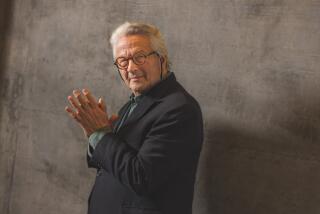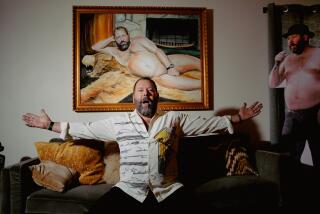Funny Life in a Cab in ‘9 Years Behind Wheel’
- Share via
The highlight of tonight’s 8 p.m. Filmforum presentation at LACE of work by San Francisco film maker Edward Jones is his exuberant 45-minute “Nine Years Behind the Wheel,” a thoroughly irreverent and frequently funny visual diary of his bread-and-butter existence as a night-shift cabdriver. Beneath the ample humor derived from his day-to-day encounters, however, there lurks a serious film maker longing to be able to free himself of the drudgery of having to support himself as a cabbie.
Jones seems to have swivel-mounted a camera on his dashboard somewhat to the left of the steering wheel, for we get glimpses of the right side of his face as he points the lens at passengers in his back seat. (At other times he’ll whip the camera around and point it out the car window as we move swiftly over hilly nighttime San Francisco streets.) By no means are we always inside the cab, but the film, all jagged darts and jabs, keeps moving at the same brisk pace.
As you would expect, Jones does encounter a fair share of characters on the night shift in a city of tourists, conventioneers and heavy drinkers. There are pretty girls, old women, hookers, porn actresses eager to reveal their charms, transvestites, ordinary folks--and one celebrity, singer Jon Hendrix. (Not everyone is happy to be filmed, by the way.) There are glimpses of members of Jones’ family, girlfriends (old and new) and co-workers with names like Honest Guido. Jones takes us to art gallery openings, seedy cabbie hangout arcades and even to Ann Arbor, where he’s serving as a judge at its noted annual festival of avant-garde films. Skinny and bespectacled, Jones (who will be present tonight) comes across as a man who loves life and people and as an artist of a comprehensive and compassionate sensibility. Jones’ running commentary and his rollicking score complete his highly infectious picture. “Nine Years Behind the Wheel” is accompanied by a number of shorts, which also bear Jones’ off-the-wall wit and rhythmic sense of pace. (213) 276-7452, (714) 923-2441.
The concluding week of the UCLA Film and Television Archives’ “Back of Beyond,” a monumental and unprecedented survey of Australian cinema and TV, includes highlights from several Kennedy-Miller miniseries. In the United States, George Miller is famous as the creator of the “Mad Max” trilogy who also directed a segment of “Twilight Zone: The Movie” and last year’s popular “Witches of Eastwick,” but his major contributions as a television producer are virtually unknown here. (Bryan Kennedy, Miller’s longtime producing partner, was killed in an accident in 1983.) A sampling of two Kennedy-Miller series, the brand-new “The Dirt-water Dynasty” and the highly acclaimed “Vietnam” (1987), whets one’s appetite for more.
The first is in the classic mode of the tempestuous epic novel of the empire builder who progresses from rags to riches at great cost to himself and those he loves. In this instance the determined hero Richard Eastwick (Hugo Weaving) is a London orphan born in 1878 who, after a brutalizing stint as a coal miner, emigrates to Sydney in 1895 to seek his fortune. He ends up as a cattle and land baron, fabulously rich but desperately lonely.
The second film focuses on the impact of the Vietnam War on one Australian family, headed by a top government adviser (Barry Otto) whose two teen-aged children (Nicholas Eadie, Nicole Kidman) are aimlessly drifting at the time their country becomes involved in the conflict. By the end of the first chapter it’s clear that “Vietnam” also will give us a unique perspective on our own role in the war.
Both these miniseries waste not a second in catching us up in them. They’re briskly paced, succinct, exciting and intelligent--in short, vastly entertaining--and they attest to the Kennedy-Miller policy of respecting television as seriously as film. Indeed, it is significant that John Duigan, responsible for the recent and outstanding “The Year My Voice Broke,” was one of the writers of both these series and the co-director of “Vietnam.” For information on the many other offerings in “Back of Beyond,” which includes a rare screening of Fred Schepisi’s unforgettable autobiographical first feature, “The Devil’s Playground” (1976), and the premiere of its half-hour prequel, “The Priest” (1973), call (213) 206-8013 or 206-FILM.
More to Read
Only good movies
Get the Indie Focus newsletter, Mark Olsen's weekly guide to the world of cinema.
You may occasionally receive promotional content from the Los Angeles Times.










